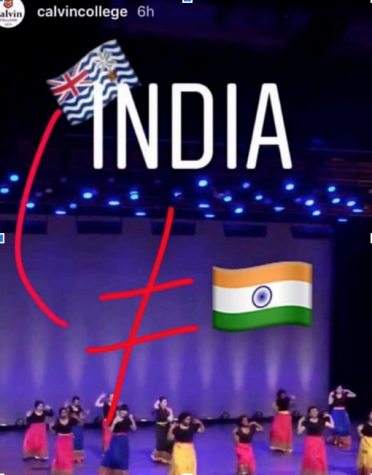The power of story (and symbol)
We all have stories, and our stories are a part of who we are.
This past weekend, I joined a sold-out crowd in watching Rangeela, Calvin’s annual cultural showcase largely created by students. The show was themed “The Story We Tell”: an affirmation of the diversity of stories we carry with us from all over the world. I watched with mixed emotions: joy for the work my friends were bringing to life, sorrow for the injustices shared in skits, pride for a campus that intentionally seeks to celebrate cultures.
When I rewatched highlights from Calvin’s official Instagram story,

The screenshot of Calvin’s Instagram post with the wrong flag.
I was bemused to find that the India act had been labeled with the emoji of a flag I didn’t recognize, which turned out to be the flag of the British Indian Ocean Territory. Later, I would find that this mishap had created an uproar among many — especially those who identified with the international community at Calvin and the production of Rangeela.
“This is an example of how the need for education on diversity and the acceptance of people from every nation has to be taught to future generations,” wrote one of the act’s co-leaders in a social media post calling out Calvin for the blunder. Others made posts, comments and emails as well. Amid comments of support and shock on that first post, someone else wrote, “Accidents happen… give them grace.” Both of these sentiments are important to this story.
My point is not to paint villains, but to emphasize the continuing need for all of us to learn and grow from each other’s stories. At Calvin, there are so many opportunities to hear about a great deal of things about a great deal of people. I encourage you not to be complacent, but to keep seeking out the events, dialogues and people that can point you to stories that move you towards an ever-growing picture of heavenly kingdom on this wild earth. Perhaps it will lead you to being able to recognize the flag of the second most populous country in the world. Who knows?
The tales told in Rangeela shows and the fuss made over a misrepresented symbol are just examples of the stories that matter to the people around us. And those stories try to be heard all the time, because stories shape us. At Chimes, we try to tell the stories that matter to the campus community, and get people talking and thinking about the good, the bad and the in-betweens. That’s what good journalism aims to do: investigate, empathize and, ultimately, love our neighbors by listening to their stories and representing them well.


